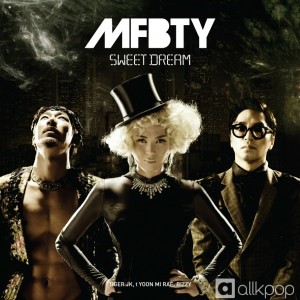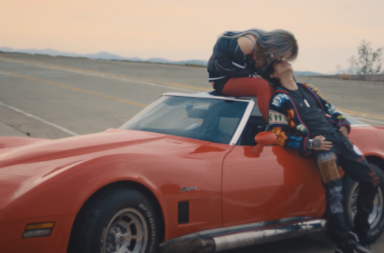 K-hip-hop came to forefront of the news when Swings pushed the first domino by releasing “King Swings,” a track intending to have a similar effect as that of Kendrick Lamar‘s feature in Big Sean‘s “Control” in the US. But what came after was countless diss tracks, all based on the beat of “Control,” with the participating artists using the opportunity to air some dirty laundry while boasting of their own merits. One of the repeating messages involved a chasm between the perceptions of mainstream and underground artists as well as a dislike for idol music. Probably the most memorable exchange of all, however, were the tracks tossed back and forth between two pairs: E-Sens and Gaeko versus Swings and Simon D, making known that E-Sens’ departure from Amoeba Culture wasn’t as smooth as it may have initially appeared.
K-hip-hop came to forefront of the news when Swings pushed the first domino by releasing “King Swings,” a track intending to have a similar effect as that of Kendrick Lamar‘s feature in Big Sean‘s “Control” in the US. But what came after was countless diss tracks, all based on the beat of “Control,” with the participating artists using the opportunity to air some dirty laundry while boasting of their own merits. One of the repeating messages involved a chasm between the perceptions of mainstream and underground artists as well as a dislike for idol music. Probably the most memorable exchange of all, however, were the tracks tossed back and forth between two pairs: E-Sens and Gaeko versus Swings and Simon D, making known that E-Sens’ departure from Amoeba Culture wasn’t as smooth as it may have initially appeared.
As this diss battle gained a lot of attention, even from those who don’t normally follow K-hip-hop, there is a foreseeable long term impact on the Korean music scene. Three part question. What are your thoughts on the diss tracks incident? And more importantly, do you think K-hip-hop is on the rise in terms of its mainstream visibility to an international audience? Lastly, is it possible for K-hip-hop to gain a substantial international fandom, one that’s sufficient enough for artists to hold their own performances overseas and sustain itself independent of the idol side of K-pop?
Laverne: Feuds and diss tracks are common in hip-hop but this is the first time that I’ve seen K-hip-hop garner attention for it. The thing that stands out to me is how the respondents all tried to maintain their credibility. Instead of keeping silent, each rapper replied not only to tell their own version, but to try and assert dominance over the rapper they replied to. This assertion of their credibility is interesting because they want to be seen as legit. It’s a contrast to K-pop where K-pop “rappers” don’t need credibility to exist.
But even though this incident gained a lot of notice, I don’t think it makes K-hip-hop more appealing to the mainstream K-pop audience. Sure, it resulted in more visibility, but if you’re not already a fan of hip-hop and rap then, at best, this whole situation is just an interesting passing feud. It may have resulted in a few people getting interested in K-hip-hop but it’s not going to convert a whole bunch of people. Rather, what I think it did do is reaffirm to existing fans of K-hip-hop that these rappers are either legit or posers.
 I don’t think that K-hip-hop will ever gain a substantial international fandom because of the limited prevalence of Korean speakers overseas. Rap is an art, and while flow and the way lyrics are performed are important, I think the lyrics are even more important. While I appreciate K-hip-hop, it’s hard to connect with it because reading a translation of the lyrics is much different than understanding the lyrics. And that’s not even including slang, colloquialisms, and idioms. I don’t think enough international fans will truly appreciate K-hip-hop for it to sustain itself overseas in the same way K-pop is able to.
I don’t think that K-hip-hop will ever gain a substantial international fandom because of the limited prevalence of Korean speakers overseas. Rap is an art, and while flow and the way lyrics are performed are important, I think the lyrics are even more important. While I appreciate K-hip-hop, it’s hard to connect with it because reading a translation of the lyrics is much different than understanding the lyrics. And that’s not even including slang, colloquialisms, and idioms. I don’t think enough international fans will truly appreciate K-hip-hop for it to sustain itself overseas in the same way K-pop is able to.
Gabrielle: While I’m not a fan of the “diss track” incidents, I’m kind of glad it happened. K-pop is such a well orchestrated genre that it was nice to see something so raw. K-hip-hop often gets ignored because of the not-so-good reputation that K-pop hip-hop has gained over the years with taking the untalented member (or dancer) and turning him/her into the group’s “rapper.” Rappers almost have a bigger hurdle to get over than vocalists because of the untalented stigma. It was nice to see the K-hip-hop artists take part in something that had nothing to do with the K-pop boom or idols. It’s a purely hip-hop incident and, better yet, one that is going on specifically with Korean artists.
Pat: As Laverne said, diss tracks are common in hip-hop in general. While I initially enjoyed the diss tracks, it left an unsavory taste once nugu rappers started joining in, taking away attention from the main discourse set about by the E-Sens and Gaeko versus Swings and Simon D diss tracks. While, yes, the incident has gained K-hip-hop notice from the standard K-pop fans, I doubt there will be gain for K-hip-hop from this incident. Not only were several of these K-pop fans ignorant on what the diss tracks were about, some did not even know or bother to know the place of diss tracks in hip-hop in general.
As for a substantial international fandom, I highly doubt that they would be able to hold any large concerts such as SM Town or the like. It is probably only Koreans who will be able to fully understand everything. There is just so much lost in translation. With K-pop, we are able to enjoy everything even without knowing what they are singing about due to the visual aspect of their performances. But that is not present in K-hip-hop where their artistry relies on understanding of their songs in their full context with their slang, metaphors, puns and every other wordplay that is out there.
 That being said, I don’t think this will affect their audience. People who are into K-pop either like hip-hop or they don’t, and if they do, they usually are looking to Western artists for their fix. They may be “entertained” by the events that are going on, but K-hip-hop often has a much deeper back story lyrically than most pop hits. Like Laverne said, the entire performance of hip-hop is important to the piece so, at least for international fans, it may not sway them either way.
That being said, I don’t think this will affect their audience. People who are into K-pop either like hip-hop or they don’t, and if they do, they usually are looking to Western artists for their fix. They may be “entertained” by the events that are going on, but K-hip-hop often has a much deeper back story lyrically than most pop hits. Like Laverne said, the entire performance of hip-hop is important to the piece so, at least for international fans, it may not sway them either way.
Sahar: I co-sign with Pat — it will be challenging to build a substantial international fandom for a genre that relies so much on fans understanding what people are saying. One can go crazy over a Shinhwa or Super Junior song without knowing what they are saying, but in hip-hop, the beats take much more of a backseat to the narrative of the lyrics. Speaking as a fan who doesn’t have much more than a very basic comprehension of Korean, I require a good sound to capture my attention. Most of the time that comes from something with more of a pop sound. But, occasionally, there are rappers who catch my attention. So Ji-sub is an excellent example. His song “Eraser” was beautifully produced. His flow was sublime, and actually, so were the lyrics, once I saw them in translation. But most performers don’t have that kind of language-independent aesthetic. It will be hard for them to translate success in Korea to a non-Korean speaking audience. Diss tracks, in that context, don’t matter much I think.
Amy: Like others have mentioned, hip-hop is a genre that’s very dependent on the content of the lyrics, and K-hip-hop is already not a huge genre in Korea compared to pop, so the proportion of international fans who understand it and are willing to spend time translating and spreading K-hip-hop is much smaller, understandably, than that of K-pop. It’s a genre that I personally would love to get more into, but it’s very hard to find a lot of English-language sources for it, though there is definitely a rise in the resources available.
Sahar, I’m not sure I agree that “most performers don’t have that kind of language-independent aesthetic.” In fact, there are many K-hip-hop artists who do make great music, independent of the content of their lyrics, and So Ji-sub is someone I can barely even call a rapper.
Mark: Sounds like you’re working on your own diss track, Amy?
 Diss tracks are lame regardless of the language because it allows for artists to steal a momentary spotlight on the basis of hate. If said rappers are so much better than those they call out, then it’s rather small to point it out on a publicly released track. Why not just put out quality music and let the fans and critics decide? Demeaning others on a track for the sake of one’s own bravado is arrogant and petty. The 15 minutes of fame generated from such an act is far overshadowed by the antagonism that is created by those who have been defamed (and those who support them).
Diss tracks are lame regardless of the language because it allows for artists to steal a momentary spotlight on the basis of hate. If said rappers are so much better than those they call out, then it’s rather small to point it out on a publicly released track. Why not just put out quality music and let the fans and critics decide? Demeaning others on a track for the sake of one’s own bravado is arrogant and petty. The 15 minutes of fame generated from such an act is far overshadowed by the antagonism that is created by those who have been defamed (and those who support them).
Like most of you have mentioned, genuine hip-hop will not and should not transcend its language barrier. Great hip-hop relies heavily on its lyrical content, storytelling ability, wordplay, and punch lines. Not only is it required that I understand the language to appreciate it, I’d have to understand the language at an advanced level to appreciate things like rhyme scheme, puns, and secondary definitions (for example, see the title of this post).
Hip-hop is still growing in Korea and K-hip-hop should thrive as long as there is a vibrant domestic music industry. The overseas diaspora of Korean-speaking peoples isn’t that huge so it would make more sense that K-hip-hop focus specifically on its home market.
Lindsay: This is one of those situations in the Korean music scene that passed right over my head. I don’t personally follow K-hip-hop and, in fact, I don’t follow hip-hop from any country. Although the term “diss track” isn’t completely alien to me, it certainly isn’t familiar either. I do recognize the bravado associated with the hip-hop culture in general, though, and can only imagine that leads to things such as tracks specifically created to tear someone else’s reputation down. All I can say, personally, is that this was all unfolding as I was watching Dynamic Duo perform live and they were absolutely phenomenal performers. Because of that, no matter who’s right or wrong in the actual conflict, I’m just going to side with them in true biased K-popper fashion.
 As for language barriers, that is one thing I appreciate about Jay Park — even if his swag attitude frustrates me sometimes. His ability to rap clever lyrics in both Korean and English makes him much more appealing to me, probably for the very reasons you all have been discussing.
As for language barriers, that is one thing I appreciate about Jay Park — even if his swag attitude frustrates me sometimes. His ability to rap clever lyrics in both Korean and English makes him much more appealing to me, probably for the very reasons you all have been discussing.
Miyoko: At this point, I don’t have much to add about the diss track incident, except that it was interesting to see it evolve (or as it’s still evolving), and see who was getting called out for what. It started as something that’s common in the genre — which is almost meaningless posturing — but turned into people getting real industry issues out. Ambika’s articles did a very good job of breaking down the issues and larger arguments about big companies with a more “family friendly” bent versus smaller companies or independent artists. It certainly brought more attention to the K-hip-hop scene, but I think it will impact current fans (as others have said, etc.).
As for international spread, I agree with the above points that it would be hard because of the need to understand the lyrics and limited availability of English sources. However, as someone who does listen to K-hip-hop and doesn’t speak Korean, two points as to my enjoyment.
First, it depends on what we’re talking about when we say “hip-hop,” which encompasses more than rapping, as Amy alluded to. Sampling, mixing, rhythm play, and beat creation is all a part of it. I’m not denying the importance of rapping and lyrics, and I do try my hardest to find lyric and context translations, but there are other musical, non-language dependent aspects to appreciate. For me, personally, I’m obsessed with percussion and rhythm, so even listening to the rapping becomes a musical experience independent of lyrics. I’m not getting the full picture, but I still find enjoyment in it. I think a track like MFBTY‘s “Sweet Dream” is a good example of something that gathers all those elements together and is accessible.
Secondly, as Amy mentioned, there are more English translations becoming available. Gaeko’s “Rhythm is Life” went from awesome to super awesome because there are not only lyric translations, but also context translations from fans. But then the question becomes, what songs and what companies can you find translations for and information on? It’s the bigger ones, or artists signed to major labels, who have the exposure, popularity, time, resources, etc. Which is interesting to see where certain artists placed those “big” artists in the diss track incident.
I guess also my question is — are the artists interested in expanding internationally? We talk about international spread like it’s the ultimate goal, but some artists probably aren’t aiming for that. Some are, like Dynamic Duo, but it doesn’t seem to me to be an entire industry push like you could argue for K-pop.

Kelsey: For me, even though many of the tracks did have a fair amount of self-promoting and dissing that is common within hip-hop culture, I enjoyed reading the translations of some of these songs. With Korean hip-hop existing in part on an underground plane, Kendrick Lamar’s “Control” verse seemed to spark this incredibly interesting venting period where a lot of artists are engaging in this bigger, more intense conversation about the challenges of the hip-hop scene, the unresolved tensions between artists, and the desire to stand out among the pack. As a K-pop fan, this level of raw communication is usually inaccessible, so it has been refreshing to follow the exchanges that have unfolded over the past few weeks. Miyoko’s right — a lot of this seems to be about industry issues below the surface, but as someone who doesn’t know much about Korean hip-hop, it has made me gravitate towards the genre to see exactly what’s going on.
That being said, I don’t think there’s yet any capacity for Korean hip-hop to go abroad when a large international fanbase isn’t really there just yet, for many of the reasons that have already been stated.
Ambika: Riding on Miyoko’s coattails, I agree that you can enjoy a hip-hop track without having to know the lyrics even though knowing them most obviously enriches the experience and gives it the intended meaning. Admittedly, if I find the lyrics to a K-hip-hop song impressive but don’t find the way it sounds to be something I’d want to listen to, I’m just not going to listen to it. First and foremost, music is to be listened to, and unless something jars what is heard (like unpleasant lyrics), it can still be enjoyed despite the language barrier. In that respect, while I don’t think K-hip-hop can build a substantial international fandom, I do think it can have at least enough for shows that combine multiple artists from different entertainment companies, like a regular music show with a focus on hip-hop. I don’t even think the shows would need much to spruce them up since most performers usually have enough experience to work a crowd.
I don’t think a lot of the artists have international expansion in mind, especially when their expansion in South Korea itself is lacking. But once they do reach the top, logically, it makes sense to see if there’s promise elsewhere, to project another image of Korean music. For the US specifically, I know Tiger JK, Yoon Mi-rae, and Leessang came for a family concert while Dynamic Duo and Simon D showed up last year for a show as well. But, then again, those are the people you’d expect to have a show overseas.
 Erika: I don’t see this incident raising the international profile of K-hip-hop, but I can see the potential of K-hip-hop to gain an underground international following based on the quality of the diss tracks released recently. Everybody went hard–with the lyrics, with the delivery. Even the production went hard! Those beats are it, absolutely. These elements I think can help K-hip-hop transcend the language barrier. So much meaning was conveyed just by the musical content and the swag and fury of each verse, I can see hip-hop heads abroad being appreciative, even if they can’t understand what’s being said.
Erika: I don’t see this incident raising the international profile of K-hip-hop, but I can see the potential of K-hip-hop to gain an underground international following based on the quality of the diss tracks released recently. Everybody went hard–with the lyrics, with the delivery. Even the production went hard! Those beats are it, absolutely. These elements I think can help K-hip-hop transcend the language barrier. So much meaning was conveyed just by the musical content and the swag and fury of each verse, I can see hip-hop heads abroad being appreciative, even if they can’t understand what’s being said.
I can see this whole episode helping K-hip-hop domestically also, just through exposure making the burgeoning genre more present in people’s minds. I don’t think it’s a given that it will, but I definitely think it could. In the end, these diss tracks served hip-hop in the way that diss tracks should. They helped elevate the game by challenging those involved to bring their best, and opened the door for expansion. This is why I love a good diss track!
Leslie: While I often find diss tracks distasteful and petty because I’m just not a particularly confrontational person, in this case, I don’t think all of them were entirely like that, as quite a few seemed to go beyond the mere worth of an artist and into the larger business and industry issues, like Miyoko mentioned, which are often swept under the rug with a “no comment.” It really opens up the K-hip-hop scene since all of this has shown a more raw side to a community of artists who have given us the front of being relatively amicable and supportive of one another.
But since diss tracks are part of hip-hop, I wouldn’t say it gives the genre a bad rap. It comes with the style, though admittedly it might appear that way to someone not familiar with it. Thematically, though, I can’t see the average Korean consumer disagreeing entirely with them, as not everyone likes and listens to mainstream and idol music. In that sense, I can see more of a domestic audience giving hip-hop a chance.
And I wouldn’t agree that it shouldn’t transcend the language barrier. The barrier is definitely harder to overcome than, say, with idol music due to the social and cultural commentaries that can go over the heads of international fans. However, flow and rhythm are evident to listeners even if they don’t understand lyrics. I particularly started liking K-hip-hop because of the percussion and just the sound of it. Korean is great for hip-hop because of the staccato nature of the language since it uses a lot of consonants, and the lack of understanding lets me appreciate the aesthetic nature of the language. Once I started understanding the language, the lyrics, and their context, my appreciation greatly increased. But, regardless, an international fan can still enjoy K-hip-hop.
 However, I really can’t see K-hip-hop ever specifically targeting an international audience. The artists would enjoy performing abroad, but their emphasis is on the lyrics, as has been mentioned several times, so they know that Korean fans are going to appreciate their music a little bit more than any fans abroad will.
However, I really can’t see K-hip-hop ever specifically targeting an international audience. The artists would enjoy performing abroad, but their emphasis is on the lyrics, as has been mentioned several times, so they know that Korean fans are going to appreciate their music a little bit more than any fans abroad will.
Shweta: Though I am limited in my knowledge of all forms of hip-hop, K-hip-hop inclusive, Ambika and Miyoko are absolutely right. A song is a song first and foremost; what lyrics it contains and the meaning it holds is secondary until you take the time to dissect it. A song can become something greater via lyrics; however, a song cannot exist independent of the quality of the music itself. Music exists to be music, and when a sense of anger precedes that, the music is lost and all you have left is hate. It’s only when you see the lyrics beyond the hate that the words carry anything worthy of its given power. Most of the time, however, that meaning is lost in translation between thoughts, lyrics, and music, be it in a language you understand or one you don’t. It’s for that reason that I am left ambivalent about “diss tracks” in general.
Under that pretense, the success of K-hip-hop overseas and the importance of “diss tracks” is rather irrelevant. The “Control” based tracks that flooded the scene are a stain in the fabric of what K-hip-hop can do on its own merits. Riding on the coattails of ten second fame (for all the wrong reasons) will not give the genre the respect it deserves, nor will it give the artists who spend their lives devoted to the art form the satisfaction they most likely desire. Music doesn’t have to seek to make a splash in international markets to be relevant or noteworthy. Can’t we just leave them where they are happiest–making music that they love?
(Images via Amoeba Culture)


